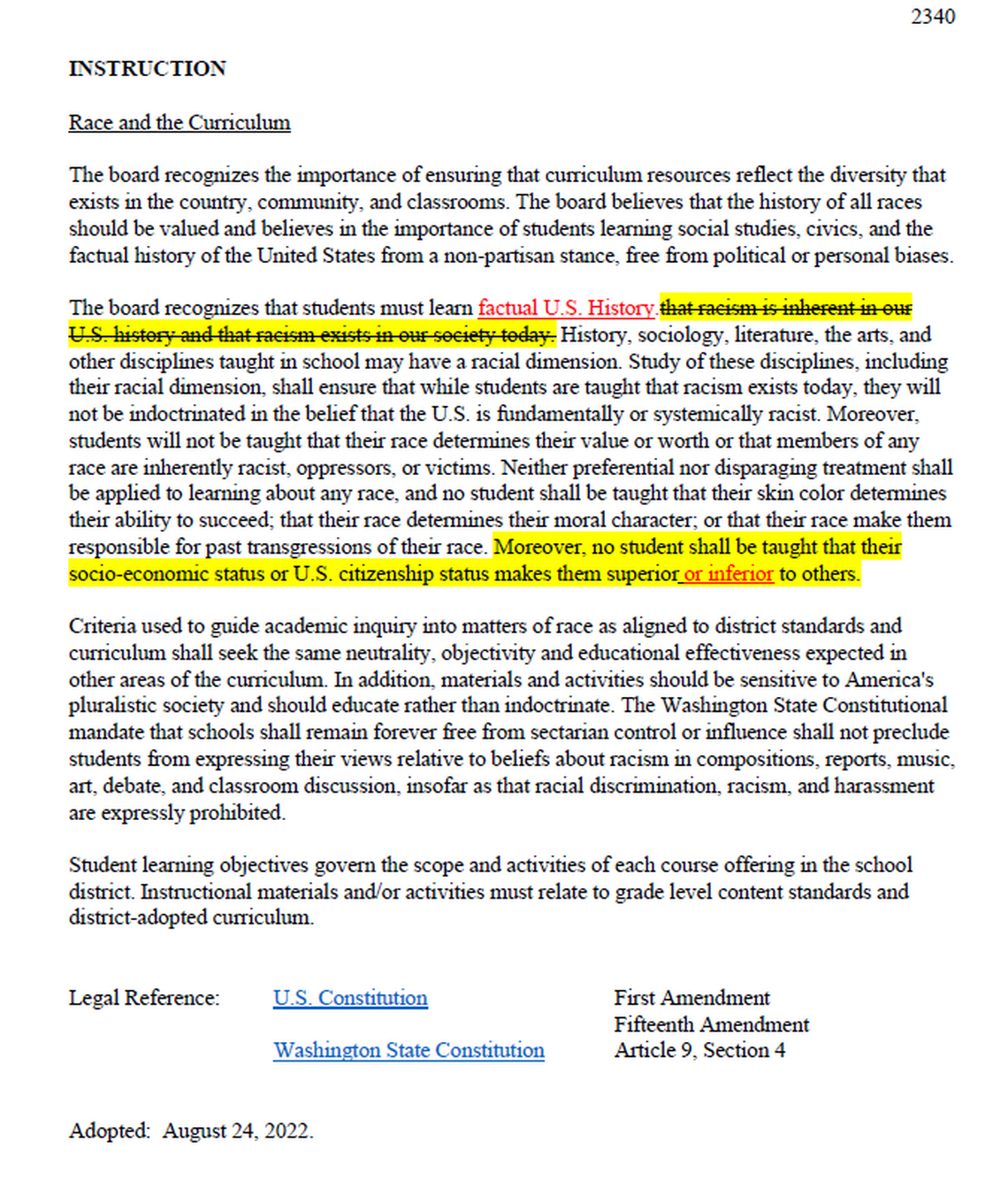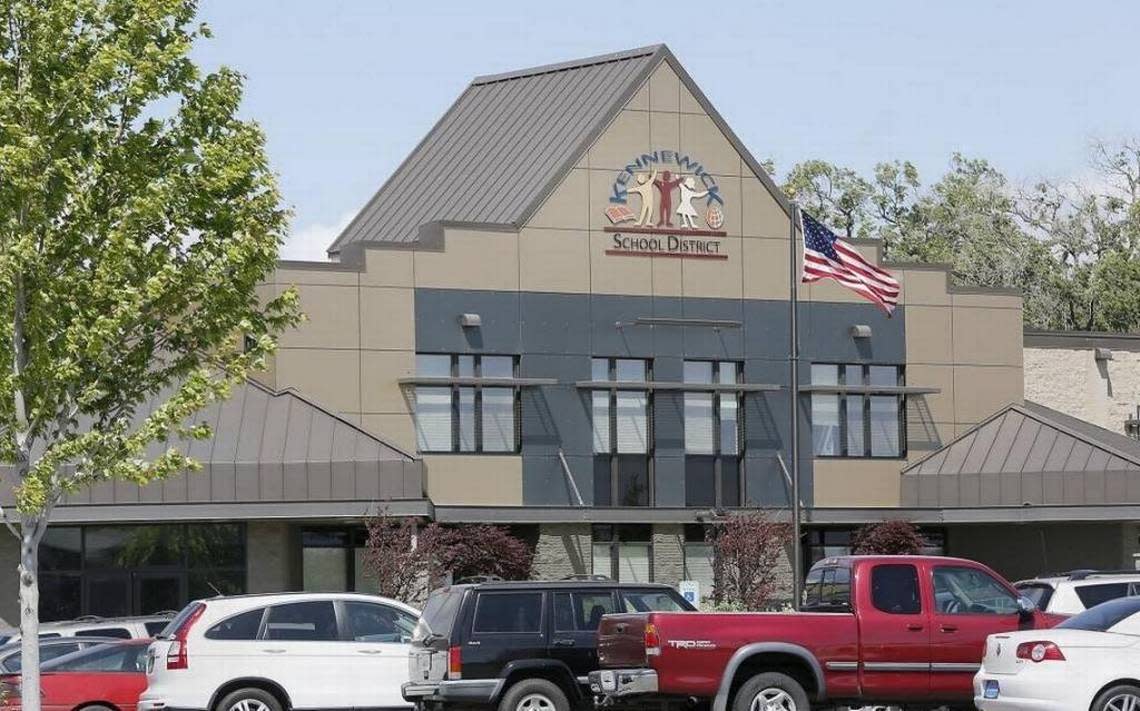Kennewick School Board passes new CRT policy. Did they actually teach it?
The Kennewick School Board last week passed a new policy on what teachers can and cannot teach students about U.S. history.
The policy says students cannot be “indoctrinated into the belief that the U.S. is fundamentally or systemically racist,” and that students must learn “factual U.S. history.”
But many local school officials say the policy largely won’t affect what students already learn in the classroom.
The policy spells out that students won’t be taught that their race determines their value or worth or that members of a race are “inherently racist, oppressors or victims.”
“Neither preferential nor disparaging treatment shall be applied to learning about any race, and no student shall be taught that their skin color determines their ability to succeed; that their race determines their moral character; or that their race makes them responsible for past transgressions of their race,” read the policy.
Last week’s vote was unanimous among the five school board members.

Passage of the policy comes after the school board met in June at its annual retreat to discuss taking a stance on Critical Race Theory, also known as CRT. A few school board members are attempting to crack down on what they see is CRT instruction in classrooms.
Richland and Pasco school boards have not publicly taken up the issue.
The term Critical Race Theory emerged in the 1970s in legal circles as a way to examine the law in how it serves the interests of people in power at the expense of others.
Conservatives in recent years have used the term CRT as a broad umbrella to encompass progressive ways of re-examining the U.S.’s troubled history with slavery, racism and civil rights.
Kennewick board member Gabe Galbraith said the school board’s new policy represents a “common ground on covering concerns in the community” that also works to keep out politically leaning content, such as the 1619 Project and Zinn Education Project, which are not part of school curriculum.
“Anytime in politics, there’s give and take. Could this have been stronger? I think so. But we had a great discussion in June and everyone was able to voice their concerns and thoughts, and I think we were able to capture that in this policy,” he said.
Galbraith said this policy doesn’t bar teachers from teaching complex and nuanced historical events, such as segregation, slavery or Jim Crow-era laws. But it does act as an accountability measure for teachers who may veer into political opinion, he said.
No issues likely, district says
Some board members were hoping for a more formal condemnation of CRT.
Micah Valentine, one of the board’s most vocal conservatives, said he would have liked to see a statute in the policy saying that “no CRT to be taught,” but the board disagreed on that.
Rob Woodford, president of the Kennewick Education Association teacher union, said the few tweaks the board made to Policy 2340 was evidence enough that CRT has never been an issue in the Kennewick School District.

“Educators in Kennewick have always done a great job presenting factual information to students in a professional manner, and that will continue to be the case regardless of incendiary — but, ultimately, unsubstantiated — issues, which tend to rise up and then fade away,” Woodford wrote in an email.
Policy 2340 codifies what is already “current practice and expectation,” said Robyn Chastain, the district’s executive director of communications and public relations.
“As such, we do not anticipate there being any issues with teachers violating this policy. Long standing policy states that teachers must teach the district curriculum and use approved instructional materials, and this policy aligns with those existing policies,” she wrote in an email.
Discipline for violating this new policy, or any existing policy, is always “situation specific” and are investigated, Chastain said.
What history do students learn?
OSPI’s social studies learning standards revolve around a broad understanding of social study skills, civics, economics, geography and history. CRT is not taught in Kennewick, Superintendent Traci Pierce has said.
Social studies in the elementary classroom mostly focuses on strengthening students’ core understanding of civics, geography, critical thinking and economics. These students learn about world history, Washington state history and U.S. history.
In sixth-grade world history, students begin learning about the study of world civilizations. That includes an understanding of how Native Americans developed civilizations around the globe and the Age of Exploration.
Students will generally take Washington state history in seventh-grade, which covers the era of Native American-European contact in the Pacific Northwest to present day.
And in eighth-grade, students take a deep dive into U.S. history and government, from 1776 to 1877. Students learn about the founding of the U.S. and the Constitution, and explore the development of politics, society, culture and economy.
In high school, students are taught about modern world history and geography, from 1450 to present, where students explore human rights cases, revolutions and the development of democracy.
Students’ understanding of civics, economics, geography and history culminate in their 12th-grade civics and contemporary world problems class, where they explore the pressing issues of modern day. Students look at “global themes” rooted in environmental issues, economic development, human rights and civic action and responsibility.
“Students should graduate ready to become active citizens and leaders of their communities, the nation and the world,” read the learning standards.
